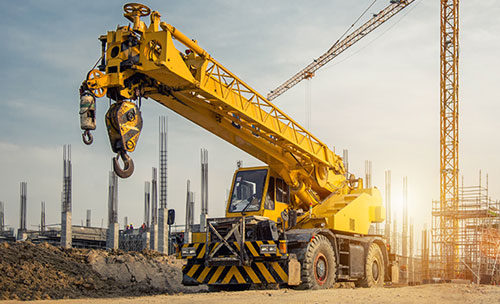
How To Operate A Mobile Crane?
Mobile cranes are very commonly used in the construction of buildings and the assembly of large equipment. They are used in various locations, such as construction sites, warehouses, and ports to complete any power-related task safely and efficiently.

In the ever-changing world of mobile crane operations, it is important to stay up-to-date with the regulations as well as best practices.
In this article, we will spotlight how mobile cranes work and what skills are required for mobile crane operators?
How Mobile Cranes Work
Mobile crane operators enable mobile cranes to lift, move, position, and place materials and equipment and perform pre‐operational inspections. They are used to calculate crane capacities, determine load weight, set up, position, and stabilize the crane before lifting. Mobile crane operators have the additional responsibilities of disassembling, traveling, and transporting mobile cranes, and also participating in rigging procedures.
Mobile cranes also perform some routine maintenance and housekeeping of the crane equipment, such as lubricating and cleaning; they are used in many industry sectors. Mobile crane drivers may be employed by companies, construction firms, manufacturers, public utilities, transport sector companies, shipbuilders, cargo handlers, airports, railways, and mines.
Types Of Mobile Cranes
Mobile cranes come in different types and sizes, such as boom truck cranes, crawlers cranes, truck-mounted cranes, rough terrain cranes, and all terrain cranes. The boom of the crane may be lattice or telescopic. Some mobile cranes are fitted with equipment, including piledriver, clamshell, dragline, wrecking ball, magnet, and personnel basket; which can perform specialized functions. They may be outfitted with heavy lift attachments, tower attachments, and luffing jibs. Some concentrate on different crane functions.
Mobile Cranes Operator Skills
A mobile crane operator may work for years on a single large site, operating a single type and size of mobile crane. The operation of some mobile cranes is physically demanding; where operators interact with other tradespeople, contractors, and customers. The skills of mobile crane operators are transferable to operating other heavy equipment. With experience, mobile crane operators may move into careers, such as business owners, supervisors, trainers, and job coordinators.
The advantages of a mobile crane operator are vast, some of which are:
- Provides flexibility and movability.
- Offers a fast setup.
- Offers a higher level of strength.
- Provides a cost-effective solution.
Safety tips for operating a mobile crane
Safety tips for operating a small or big mobile crane are very essential. Here are some of which you need to follow:
- Never override the mobile crane’s computer.
- Be aware of all overhead hazards.
- Be aware of mobile crane hand signals.
- Read the load charts – before turning the key in any new mobile crane.
- Cell phones in the cab – while the crane’s key on the cell phone is off.
- Always note the changing conditions on the job site.
- Sometimes in a working situation, the crane operator needs to stop, evaluate, and find a safer lift plan.
- Checking ground conditions is very important before crane setup.
- Ensure that the site is suitable to support your mobile crane and the future suspended loads.
- Before starting your crane, always double-check the oil, gas, and other fluid levels.
Plant & Equipment’s machinery marketplace offers an extensive range of mobile cranes for sale that are sure to meet any needs that you may have.
Learn more about What is the Difference between a Crane and Hydra Machine
 Construction Equipment
Construction Equipment
 Cranes
Cranes
 Material Handling
Material Handling
 Trucks & Trailers
Trucks & Trailers
 Vehicles
Vehicles
 Agricultural Equipment
Agricultural Equipment
 Live Auctions
Live Auctions












